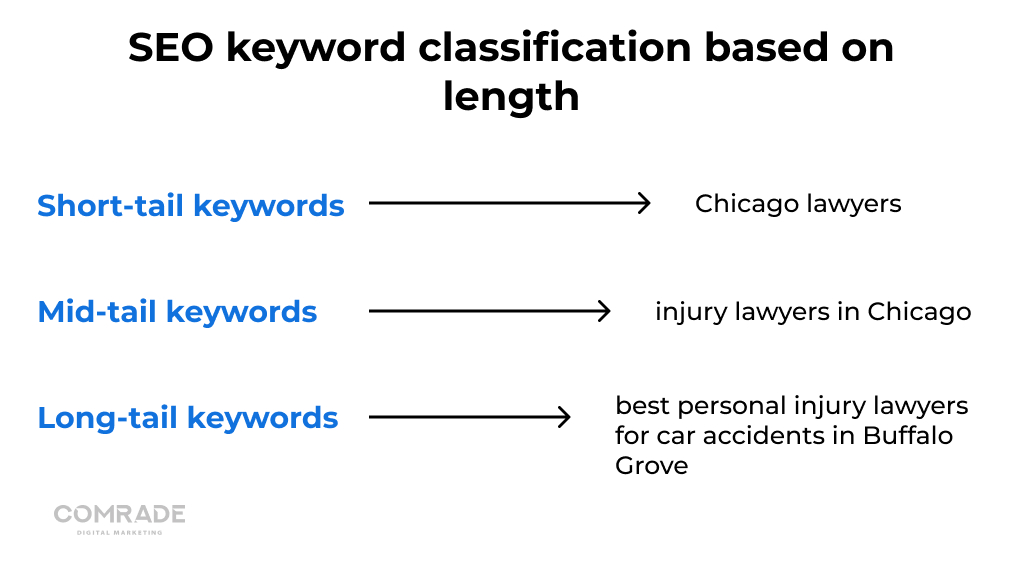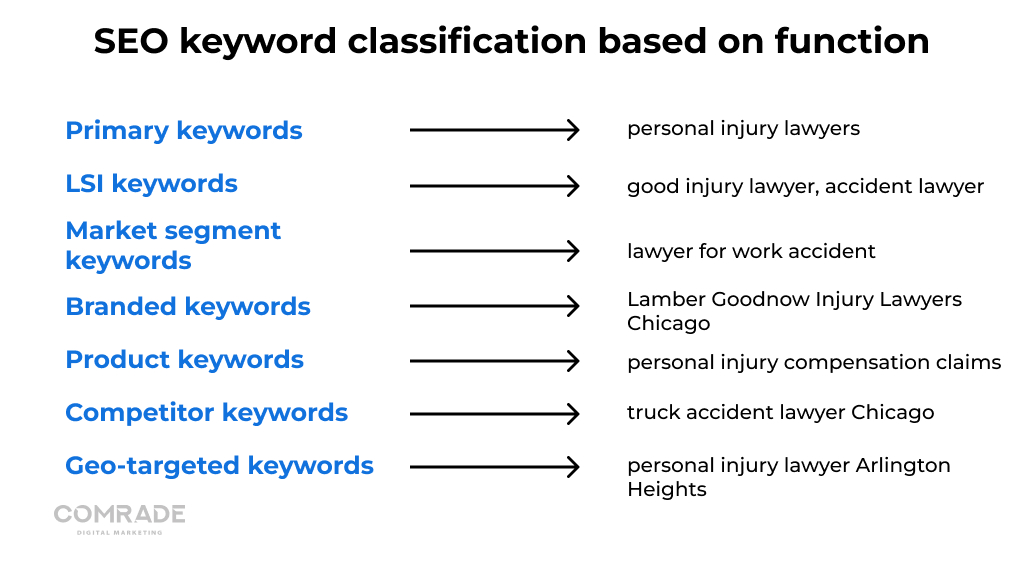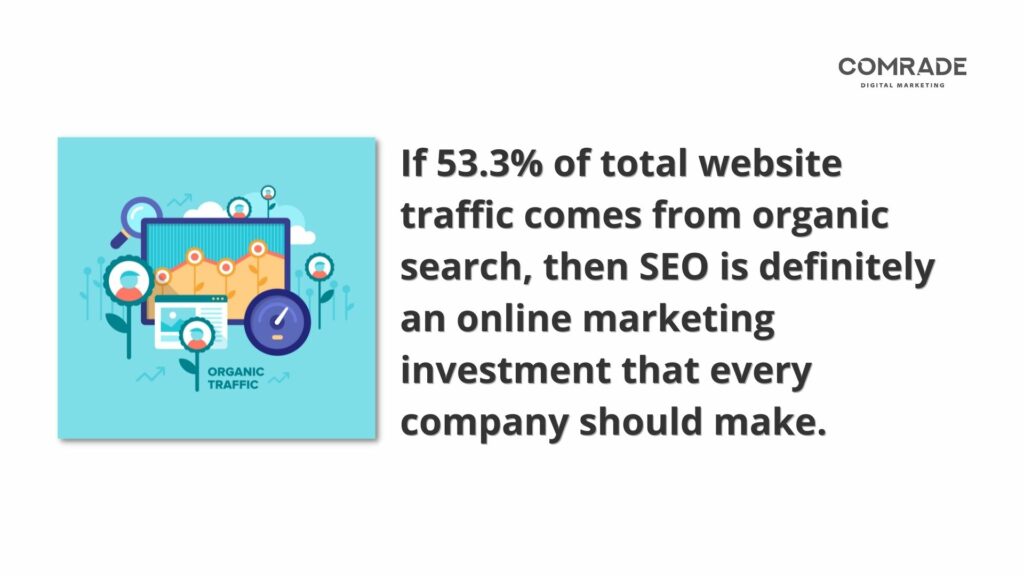One of the most important things internal marketers need to do is keyword research, and this remains true even as Google keeps changing its algorithms. Although we must be constantly prepared for new updates, keyword research is still a vital part of SEO and should be given attention regularly.
In this post, we’ll explore the ins and outs of keyword research. You’ll learn why it’s important, how to conduct your research for an SEO strategy, and how to select the right keywords for your website. By the end of this post, you’ll be equipped with the knowledge you need to build a strong keyword foundation for your SEO strategy.
What Are SEO Keywords?
SEO keywords are the words and phrases that users enter into search engines when looking for something. They’re also called “search queries.” If you consider all the elements on your page — images, videos, copy, etc. — and boil them down to their simplest form, that’s the subject of your primary keywords. Keep them in mind when creating content for your website or blog, and you’ll be able to improve your SEO significantly.
Business owners wonder “how to make my site SEO friendly?” Keywords are one of the ways to do so.
If a user’s search keywords match your website’s keywords, it will show up in search engine results pages (SERPs). So, let’s say you have a website for your law firm studio. You’ll want it to show up when users search for lawyers in your area. In this example, you will use keywords that best describe your page’s content—for instance, personal injury lawyers in Chicago, personal injury law firm, and so on.
Why Are Keywords Important for Search Engine Optimization?
When you’re planning your SEO strategy, keywords are one of the most important things to consider. The right keywords will help connect your content with the actual people searching for it. However, if you’re not careful, you could end up attracting traffic that’s looking for something else entirely. Choose your keywords wisely, and you’ll be able to draw the kind of traffic that you want to your site.
One of the things search engines examine when ranking a page is the words and multimedia on that page. For example, if there is a blog post where the best lawyer in Chicago is used five times, then the search engine understands what the page is about and that that specific keyword is significant. Therefore, if you want to make Google comprehend what your page is about, you need to use relevant SEO keywords strategically and fairly often.
However, this has to align with what your target audience is searching for. If you use the wrong keyword phrases, you’ll never get the website traffic you need because your text doesn’t match what your potential customers are searching for. When your content strategy and optimization incorporate relevant keywords, you increase the chances of showing up in Google search results.
Different Types of SEO Keywords
SEO Keyword Classification Based on Length
SEO keywords fall into three broad categories based on length, and are then further characterized according to their use:

Short-Tail Keywords
Also called head keywords or generic keywords, these cover broad search terms and gather high volumes of traffic because they only have one or two words. They are the most challenging to rank for due to their popularity. For example, Chicago lawyers.
Mid-Tail Keywords
These consist of one to three words, which provide more description of what the user intends to search for. They generally have lower traffic volume and less competition. For example, personal injury lawyers in Chicago.
Long-Tail Keywords
Long-tail keywords consist of four or more words. They are the most descriptive and the most specific to target in your content strategy. Because they have lower traffic volume and less competition, they offer a better chance to rank than other keywords—for example, best personal injury lawyers for car accidents in Buffalo Grove.
You should always incorporate a mix of keyword terms to ensure you have a well-balanced keyword strategy. This means using the correct types of keywords to address different search queries.
SEO Keyword Classification Based on Function
Below are seven categories of keywords digital marketers use. Although they may vary in length, their functions remain distinct.

Primary Keywords
A primary keyword is the main topic or idea of a web page that you want to rank for. Every single website page must have a primary keyword. Primary keywords have a high search volume and can bring considerable traffic to your website. For example, personal injury lawyers.
LSI Keywords (Latent Semantic Indexing)
These keywords are related to the main keyword you’re targeting. They support your content by adding context, so search engines and users better recognize what your web pages are about. If you’re talking about personal injury lawyers, then LSI keywords might be good injury lawyer, accident lawyer, personal injury law firm, etc.
Market Segment Keywords
Market segment keywords are generic terms linked to industries, brands, or products that your target audience may use as part of their product search during the first part of their customer journey. For example, lawyer for work accident.
Branded Keywords
These terms purposefully include a brand’s name along with specific product descriptions, a product name, or a product type. Branded keywords in SEO come from customers interested in a specific company or brand. For example, Lamber Goodnow Injury Lawyers Chicago.
Product Keywords
As the name suggests, product keywords are search terms that specifically look for certain products or services of a company. Companies should have a keyword strategy for each product and service, so prospects can find their offerings online. For example, personal injury compensation claims.
Competitor Keywords
Competitive keywords are those a company’s competitors use to generate online traffic. Utilizing the same ones helps companies appear on the same search result pages as their competitors. For example, truck accident lawyer Chicago.
Geo-Targeted Keywords
Geo-targeted keywords are terms that refer to a specific country, state, city, or neighborhood. These are especially useful for businesses that want users in close physical proximity to find them (local SEO). For example, personal injury lawyer Arlington Heights.
What Is the Best Keyword for SEO?
SEO can be difficult because you might be targeting keywords that are very competitive. While it is possible to rank for single-word SEO keywords, even if you do everything right, it can take years. A better option would be to focus on long-tail keywords. Long-tail keywords tend to be searched for less often and are usually 4 words or more. These types of keywords are usually easier to rank for because they have a lower keyword difficulty. If you are new to SEO, then long-tail keywords are a good place to start.
What Should Be My Main Keyword?
Your primary keywords are the most important ones you want to rank for. Make sure to target one to three keywords (or keyword phrases) to start.
How to Do Keyword Research for Your SEO Strategy?
To drive quality leads to your website, you’ll need to do SEO keyword research. This uncovers terms, phrases, questions, and answers that are important to your users and customers. The keyword research process entails finding all possible search queries that may be relevant to your business and customers, and then sorting and prioritizing them, which helps inform your SEO strategy.
SEO keywords should also support your online marketing goals like capturing leads, receiving more traffic, and raising brand awareness. Any keyword research tool you use should:
- Reveal how many people are searching for a given keyword
- Establish how challenging it is to rank for that keyword
- Identify who is already ranking for that keyword
- Provide suggestions for new keywords
Finding keywords can feel like searching for a needle in a haystack, but thankfully there are powerful tools and effective resources, like the ones below, that conduct research and analysis.
Use Google Suggest for Search Queries and Search Engines Results
If you’ve typed something in google and seen an auto-suggest list appear, then you’ve experienced Google Suggest. This nifty algorithm was introduced in 2007 to find the best matching phrases to main seed keywords. It provides suggestions for users while they’re typing their queries into the search box. These are based on past searches, popular searches, and past search terms. Although it was created to improve user experience on Google, it’s been adopted by many SEO specialists as a method for finding possible relevant keyword opportunities.
Ahrefs Is a Good Old Way to Find Keywords

Ahref is a popular SEO tool used to get higher Google rankings. It’s mainly used to analyze a website’s link profile, keyword rankings, and SEO health. Its keyword analysis component reveals the necessary keywords and variations thereof to improve your website’s ranking.
One of the main benefits of Ahrefs is its large backlink checking solution, its ability to dig deep into competitors’ search traffic, and its identification of what content improves your bottom line. With it, you can conduct keyword research for Google, YouTube, and Amazon. Many marketers use Ahrefs to find what’s performed impressively, in terms of social shares and/or links, on a given topic.
SEMrush Can Help You Find More Long-Tail Keywords

SEMrush is a SaaS platform used for keyword research and online ranking data, including metrics like search volume and cost per click. The software also collects information about online keywords gathered from Bing search engines. It helps organizations run digital marketing campaigns like SEP, PPC, social media marketing, and content marketing campaigns.
With the comprehensive information provided by SEMRush, businesses can identify trends in industry niches, link-building opportunities, and keyword identification. Like other keyword research and SEO software, it gives insight as to how you rank up against competition and suggests how difficult it may be to rank for specific keywords. SEMRush is well suited if you’re working on a mix of SEO and PPC projects because it includes detailed competition and distribution data.
Sellics for Amazon SEO Is One of the Great Keyword Tools
The fundamental difference between Amazon and Google is that Google seeks to answer questions, while Amazon wants to sell products. Sellics is a PPC management and optimization software program that helps businesses optimize their listings for better rankings and travel performance metrics, as well as manage reviews on Amazon.
As the leading software for Amazon vendors, it provides keyword recommendations and easily identifies optimization potential across entire product ranges. More than that, Sellics is a convenient tool for Amazon sellers who want to centralize their stats, saving time and enabling greater efficiency, without needing separate tools and extensions.
Ubersuggest Can Help with Effective Keyword Research
This unique software allows you to reverse engineer your competitors’ SEO, content marketing, and social media marketing strategy. From content ideas to keyword popularity, backlink data, and domains, Ubersuggest covers it all.
Best of all? It’s a free research and SEO tool that is excellent for generating keyword suggestions. Ubbersuggest offers related keywords, those with prepositions, comparisons, as well as search volume trends, and potential pays-per-click. The main benefit is it provides a multitude of keywords you can use that you may not come up with on your own.
Surferseo Is a New Way to Find Keywords
Surferseo is a cloud-based tool specifically designed for on-page SEO content like social media posts and articles. It simultaneously analyzes main competitor websites from Google’s top 50 organic search engine results. With its built-in keyword research and SERP tool, you can discover the average word count and keyword density.
Its SERP analyzer is one of the best on the market as it considers: text length, heading number, page speed, referring domains and URLs, and more. This helps to highlight competitive strengths and opportunities, so you can rank higher than your competition.
Google Keyword Planner Can Help You Find Keyword Ideas
Regarded as one of the best keyword research tools, Google Keyword Planner helps discover new keywords, provides monthly search numbers for keywords, determines cost-per-click, and assists with creating new search ad campaigns.
Because Google creates it, it offers seamless integration with Google Ads, meaning it’s easy to research, run and track paid ad campaigns. Importantly, it provides targeted insight into hyper-local search volumes, allowing users to perform keyword research in specific cities.
Reddit, Twitter, and Social Media Will Give You Organic Keywords
Conducting keyword research on social media and popular sites like Reddit will give you a clear understanding of constructing and communicating your message effectively. What your target audience shares on social media points to what keywords are most effective.
Leveraging trending topics is also useful as it provides relevant points of engagement for brands daily. Although this may only last for a limited period of time, it assists in discerning which topics will work best for novel and evergreen content. Remember, keyword queries differ from platform to platform, and differentiating these differences is key to long-term SEO strategies.
General Tips for Using SEO Keywords
SEO is about making the users’ experience as enjoyable as possible. Often this requires making incremental improvements, that, when combined with other optimizations, have a noticeable impact on website traffic.
Find the Right Pages to Improve
Tools such as Google Analytics, SEMrush, and others we’ve mentioned help find the best keywords for SEO. If your website is already online, you’ll want to use SEO audit services to learn which pages will benefit from improvements. Newly launched websites designed with an SEO keyword strategy require time up-and-running before you’re able to accurately determine where else additional improvements can be achieved.
Keyword strategies should be reviewed on a quarterly basis and at least 3-6 months before any campaigns or promotions. Your homepage, about page, contact page, and blog are the most important. The home page is of particular importance because it’s the first page visitors land on and the first impression users get of a business.
They need only stay on this page for a few seconds before deciding whether to investigate further or leave and go to a competing site. Headings on homepages should be easy to read, and icons should have clear and enticing calls-to-action (CTA’s). The goal is to capture the visitor’s attention and prevent them from leaving. When looking to improve pages, always start with the homepage.
Use the Right Keywords in the Right Places
Google ranks individual pages and not websites as a whole, meaning each page has the potential to rank for the topic it covers (the focus keyword). This can be supplemented further by secondary keywords, broadening the page’s reach. Hence, the importance of keyword research! And if you want a page to rank for a specific term, you should make it the focus keyword on that page.
Below are common places where keywords are needed:
- Page titles
- Meta description tags
- Subheadings
- Content
- Images
- URLs
- Hashtags (when appropriate)
- Link anchor text
- Directories and external links
Implement Keywords into Your Social Media
Hashtags provide social SEO that’s quick, instant, trends, and can improve traffic when used correctly even though they don’t have longevity. Incorporating keywords into your social media expands reach and drives traffic to your digital properties. There isn’t a one-size-fits-all strategy, so you’ll need custom approaches.
- Facebook: Use granular audience segmentation to appeal to specific target audiences with highly specific keywords.
- Twitter: The average tweet’s lifespan is 18 minutes. Keywords tend to change fast, so embracing hashtags that resonate with your audience works best.
- Instagram: Geo-targeted posts receive 79% more engagement, therefore using specific keywords for certain cities, states, or regions tends to work well.
Success on social media depends on keyword usage and content creation. These platforms are inherently unpredictable as they can change algorithms at any time, which drastically impacts organic reach. For example, Instagram has changed its algorithm many times and has stopped showing posts in chronological order, instead it displays images most valuable for the user.
For this reason, most businesses hire social media experts who keep abreast of these changes and tweak marketing strategies accordingly. Social media is an important aspect of digital marketing. Despite its volatility, it garners powerful results when selectively used to achieve business aims.
Choose Your Keywords Carefully
While there are best practices, there is no magic formula for selecting the correct keywords because it comes down to user intent. Once you understand the search intent of your target audience, you can allocate the correct words to your web copy and content marketing. There are four ways of describing user intent:
- Navigational: When users search for a particular site
- Informational: When users search for the answer to a question
- Investigational: Where users search for information that may lead to a transaction
- Transactional: Where users are ready to buy
When you know how to categorize keywords from your research, you can use this information to build your content strategy, ensuring you’re meeting users’ needs whenever they find your information. Most make the mistake of assuming that if the keyword personal injury lawyer has the highest volume, then they must pepper their content with it. This can sometimes produce adverse effects because high-volume keywords are used by most, whereas long-tail and lower volume keywords stand a better chance of ranking higher.
As you can ascertain, SEO keyword selection is a complex process that requires expertise. Generally, you’ll want to use a combination of different types of keywords, depending on content objectives.
Don’t Overuse Them!

Sometimes brands engage in keyword stuffing in an attempt to rank higher. This practice entails “stuffing” the same target terms throughout a page’s copy in an inorganic and clunky way, producing an undesirable user experience. If Google determines you’re guilty of keyword stuffing, it can demote your page or remove it altogether.
Most SEO experts believe the ideal keyword density is around 1-5%. This means the target keyword appears about one to five times per 100 words. In general, from the time you begin implementing SEO, you need at least six months for it to start yielding results. The top three results in organic search receive 75% of all clicks, and websites in those ranks have generally been around for at least a year.
This isn’t to discourage SEO efforts, but rather to illustrate the implementation of SEO keywords is a long-term strategy. This is why content marketing is fundamental to digital marketing. Rolling out a consistent stream of content keeps your website and SEO relevant. If 53.3% of total website traffic comes from organic search, then SEO is definitely an online marketing investment that every company should make.

Conclusion
As long as search engines remain commonplace in everyday life, organic results will continue to exist, and SEO keywords will maintain their value in digital marketing. SEO success relies on tactics and timing. Keywords are dynamic and must reflect changes in language and business focus. Don’t let the challenge of keeping up with SEO best practices dampen your marketing ambitions.
Let Comrade Digital Marketing Agency help you! We specialize in SEO marketing and provide a full SEO services package. After one year of SEO, our clients experience +40% ROI. Our top-rated SEO consultants provide a full range of SEO services. From SEO keyword research to creating engaging content, we promise, you’ll see the growth your business deserves. We guarantee, our SEO services will elevate your business to the next level. Receive your free SEO audit today!


